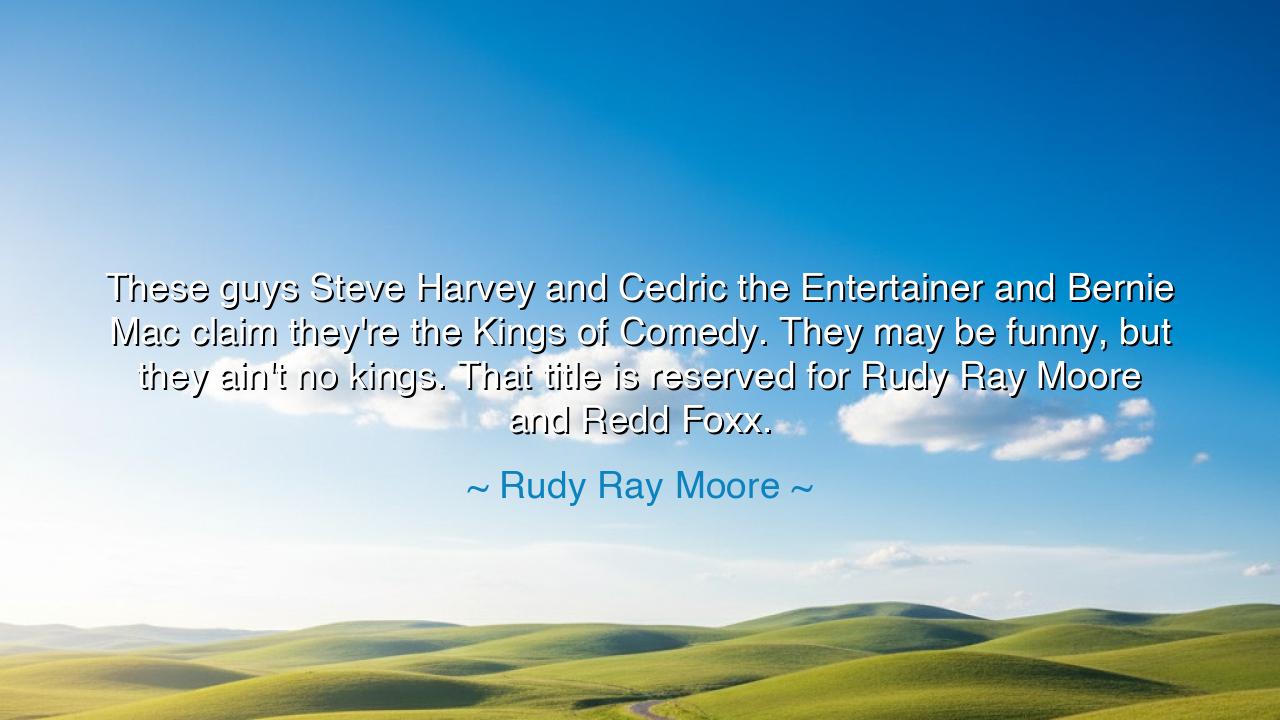
These guys Steve Harvey and Cedric the Entertainer and Bernie Mac
These guys Steve Harvey and Cedric the Entertainer and Bernie Mac claim they're the Kings of Comedy. They may be funny, but they ain't no kings. That title is reserved for Rudy Ray Moore and Redd Foxx.






The words of Rudy Ray Moore—“These guys Steve Harvey and Cedric the Entertainer and Bernie Mac claim they're the Kings of Comedy. They may be funny, but they ain't no kings. That title is reserved for Rudy Ray Moore and Redd Foxx.”—echo not as boast alone, but as a declaration of heritage, pride, and artistic truth. Beneath their bravado lies the ancient cry of the originator, the one who has paved the road long before others walked it. It is the voice of a man who remembers the roots of his craft and refuses to let history forget its foundations. Moore speaks not from envy, but from remembrance—from the sacred duty to honor those who forged laughter in struggle, who built the temples of humour when the world still refused to see them.
In his words lies the eternal struggle between the pioneers and the inheritors, between those who birth an art and those who inherit its throne. The “Kings of Comedy” that Moore names—Steve Harvey, Cedric the Entertainer, Bernie Mac—are beloved, and rightly so. Yet Moore, himself a forerunner of Black comedy, reminds us that greatness is not born in fame but in firstness, in the courage to create when there was no stage prepared, no audience yet ready. He invokes not only his own name but that of Redd Foxx, the godfather of raw and unfiltered comedy, as a call to remember where the laughter began: in the smoky clubs of segregation, in the backrooms of music halls, in the places where humour was rebellion.
To understand the depth of Moore’s claim, one must return to the world from which he rose. Long before television crowned comedians with glitter and lights, Rudy Ray Moore carved his art in the underground—his humour raunchy, fearless, and revolutionary. His persona, “Dolemite,” was both a parody and a prophecy—a bold creation that gave voice to the untamed confidence of the Black street poet and hustler. He spoke the unspeakable, laughed at the unbearable, and turned pain into power. To call himself a “king” was not arrogance, but survival; in a world that denied dignity, self-crowning was an act of defiance.
Redd Foxx, too, ruled before the world was ready to bow. He told jokes that cut through hypocrisy, jokes that carried the rhythm of the blues and the bite of truth. Long before Sanford and Son, he was the prince of the chitlin’ circuit, performing in spaces where laughter was both rebellion and release. He and Moore did not inherit an empire—they built one. When Rudy Ray Moore says the crown belongs to them, he is not diminishing those who came after; he is calling the world to remember that the tree of comedy stands because of the roots that drink deeply in the soil of struggle.
This cry of remembrance has echoed across generations of art. In the days of the poets, Homer sang of heroes long dead, lest the new world forget them. In the days of Rome, the old soldiers warned the young: “Do not claim the glory of the battle until you know who fell to win it.” So too does Moore’s voice carry this ancient wisdom. He stands not merely as a man defending his pride, but as a sentinel at the gates of legacy. To him, the title “King of Comedy” is not a crown of gold—it is a crown of endurance, of sacrifice, of laughter forged in fire.
From this we may draw a sacred lesson: do not forget the ones who came before you. Every art, every craft, every victory stands on the shoulders of those who laid its foundations. The new may shine brighter, but it is the old who built the light. True greatness is not only in achieving glory, but in giving homage to the ancestors of your art. Whether in music, in writing, in comedy, or in life—let no one ascend the throne without first bowing to the ones who raised it.
So let this be the teaching: honor the originators, and never be too proud to remember where you come from. To create is noble, but to acknowledge your lineage is divine. The wisdom of Rudy Ray Moore reminds us that crowns are not only worn; they are earned through legacy. The laughter of the present exists because the past dared to make the world smile in the midst of pain. Therefore, when you claim mastery in your field, pause and give thanks to the unseen kings and queens who paved your way.
For in the end, Moore’s words ring not as arrogance, but as a benediction: “Remember the first fires that lit your world.” The crown of comedy—or of any art—belongs not to the newest, but to the truest; not to the loudest, but to the lasting. And so, the lesson stands: honor your roots, and the world will remember your name as you have remembered theirs.






AAdministratorAdministrator
Welcome, honored guests. Please leave a comment, we will respond soon